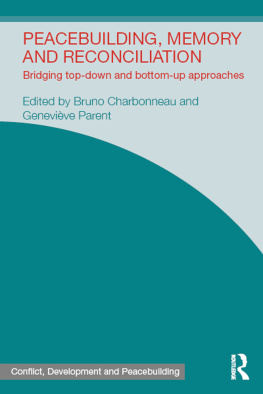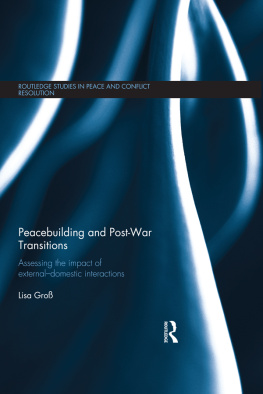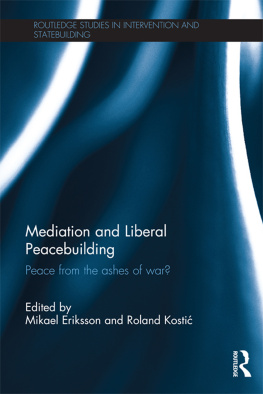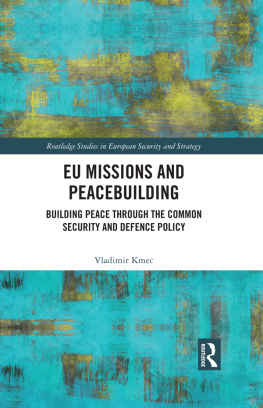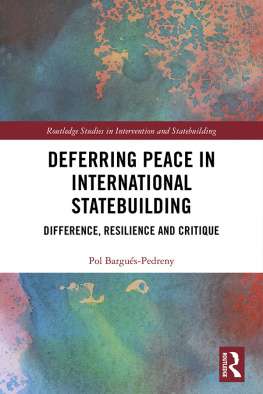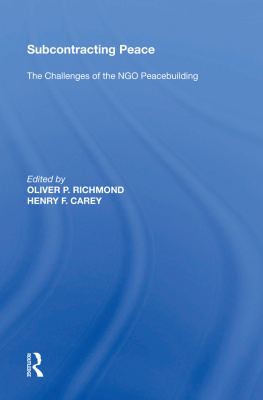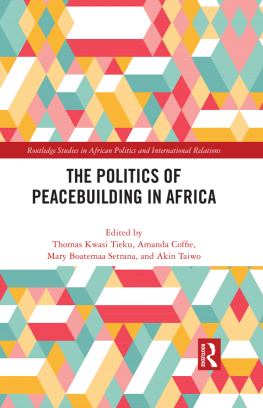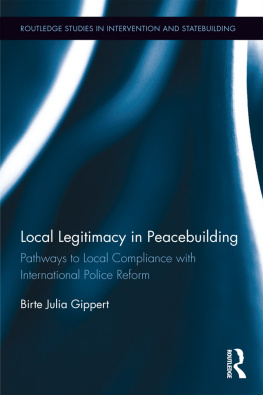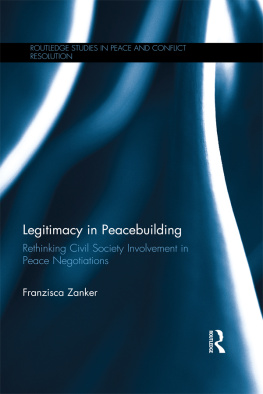Liberal Peacebuilding and the Locus of Legitimacy
Liberal peacebuilding too often builds neither peace nor Liberalism. In a growing number of cases, people arent rejecting and relegating democracy because its bad; theyre challenging it because it isnt relevant to their priorities and needs. The peacebuilding moment when consent for intervention is present and the opportunity to build a sustainable social contract between peacebuilders and people is most fruitful is being squandered. This relationship, between governed and governance, relies on mutual needs realization, but there is no formal or informal requirement and mechanism for ascertaining what the subjects of peacebuilding might prioritize. Instead, peacebuilders give the subjects of peacebuilding what they think they should have.
This legitimacy gap between what peacebuilders give and what subjects want is the subject of this book. Through a range of empirical case studies conducted by country specialists, the book reveals that, when asked, people often prioritize roads, electricity, jobs, housing, schooling and pertinent justice (amongst other things) in the immediate aftermath of war. We find that mapping this locus of legitimacy may help develop the kind of relationship upon which the sustainability of any social contract between governed and governance rests.
This book was originally published as a special issue of the Journal of Intervention and Statebuilding.
David Roberts is Senior Lecturer in International Relations at Loughborough University, UK. He is the author of four books on positive peace and numerous articles on peacebuilding, human security and Cambodia.
Liberal Peacebuilding and the
Locus of Legitimacy
Edited by
David Roberts
First published 2015
by Routledge
2 Park Square, Milton Park, Abingdon, Oxon, OX14 4RN, UK
and by Routledge
711 Third Avenue, New York, NY 10017, USA
Routledge is an imprint of the Taylor & Francis Group, an informa business
2015 Taylor & Francis
All rights reserved. No part of this book may be reprinted or reproduced or utilised in any form or by any electronic, mechanical, or other means, now known or hereafter invented, including photocopying and recording, or in any information storage or retrieval system, without permission in writing from the publishers.
Trademark notice: Product or corporate names may be trademarks or registered trademarks, and are used only for identification and explanation without intent to infringe.
British Library Cataloguing in Publication Data
A catalogue record for this book is available from the British Library
ISBN13: 978-1-138-80135-6
ePub eISBN 13: 978-1-317-62577-3
Mobipocket/Kindle eISBN 13: 978-1-317-62576-6
Typeset in Trebuchet MS
by RefineCatch Limited, Bungay, Suffolk
Publishers Note
The publisher accepts responsibility for any inconsistencies that may have arisen during the conversion of this book from journal articles to book chapters, namely the possible inclusion of journal terminology.
Disclaimer
Every effort has been made to contact copyright holders for their permission to reprint material in this book. The publishers would be grateful to hear from any copyright holder who is not here acknowledged and will undertake to rectify any errors or omissions in future editions of this book.
Contents
David Roberts
Stefanie Kappler
Stuart Gordon
Simon Robins
David Roberts
Nicolas Lemay-Hbert
The chapters in this book were originally published in the Journal of Intervention and Statebuilding, volume 7, issue 1 (March 2013). When citing this material, please use the original page numbering for each article, as follows:
Chapter 1
Everyday Legitimacy and Postconflict States: Introduction
David Roberts
Journal of Intervention and Statebuilding, volume 7, issue 1 (March 2013) pp. 110
Chapter 2
Everyday Legitimacy in Post-Conflict Spaces: The Creation of Social Legitimacy in Bosnia-Herzegovinas Cultural Arenas
Stefanie Kappler
Journal of Intervention and Statebuilding, volume 7, issue 1 (March 2013) pp. 1128
Chapter 3
Health, Conflict, Stability and Statebuilding: A House Built on Sand?
Stuart Gordon
Journal of Intervention and Statebuilding, volume 7, issue 1 (March 2013) pp. 2944
Chapter 4
An Empirical Approach to Post-conflict Legitimacy: Victims Needs and the Everyday
Simon Robins
Journal of Intervention and Statebuilding, volume 7, issue 1 (March 2013) pp. 4564
Chapter 5
Surveying South Sudan: The Liberal, the Local and the Legitimate
David Roberts
Journal of Intervention and Statebuilding, volume 7, issue 1 (March 2013) pp. 6586
Chapter 6
Everyday Legitimacy and International Administration: Global Governance and Local Legitimacy in Kosovo
Nicolas Lemay-Hbert
Journal of Intervention and Statebuilding, volume 7, issue 1 (March 2013) pp. 87104
Please direct any queries you may have about the citations to clsuk.permissions@cengage.com
David Roberts
Introduction
Stabilizing fragile, failed and failing states imagined to harbour or project malice and menace of some kind has attracted substantial academic attention and international intervention. Indeed, such matters are very much front and centre of policy and theory debates in the discipline of International Relations, where once such issues would have only attracted the attention of lesser subject areas like peace and conflict studies or development. Successful management of this securitydevelopment nexus, wherein the development of the alien Other along liberal lines is argued to render the purported security problem moot, is underpinned by and underpins the idea of the Liberal Peace, and the various international interventions such an ontology sanctions. Through this transformative force, the problematized alien nation is assimilated into the liberal international through conditioned adoption of Weberian state-centric institutions. Attempts to pacify and promote such spaces revolve around the duopoly of political and economic liberalization as the core objectives and methods of postconflict peacebuilding, which is audited and legitimated in concordance with the ideological priorities of global governance, which are fundamentally neoliberal (Call and Cousens 2008, Slotin et al. 2010). Thus, postconflict peacebuilding, wherein unstable polities are stabilized through democratization and capitalization (as distinct from postconflict development), is presently legitimated by according with external preferences and liberal norms.
The track record of this approach is unenviable, as even its supporters are beginning to concede (Paris 2010). Persistent political stability rarely ensues in the wake of the peacebuilders departure, and Liberal democracy is rarely found beyond basic technical practices and local nomenclature, undermining both the real and rhetorical rationales for intervention. These conditions are confronted in orthodox circles with more technical managerialism of elite institutions and actors, and the relegation epistemologically and ontologically of the social base upon which the elites depend for their legitimacy. Theirs is not the only offer on the table, however.









